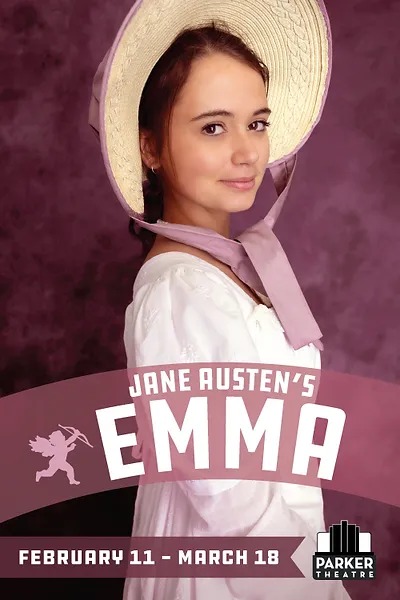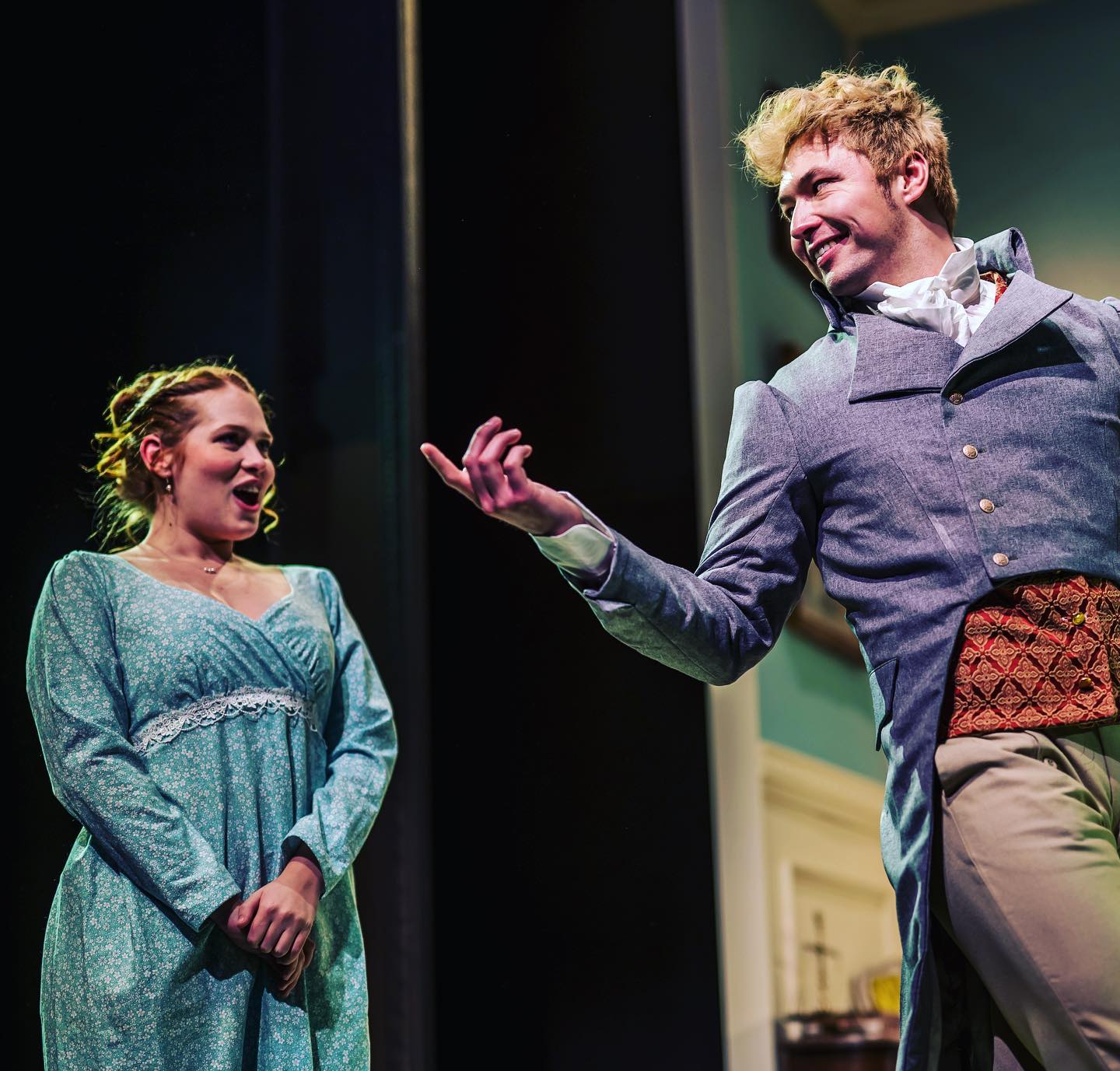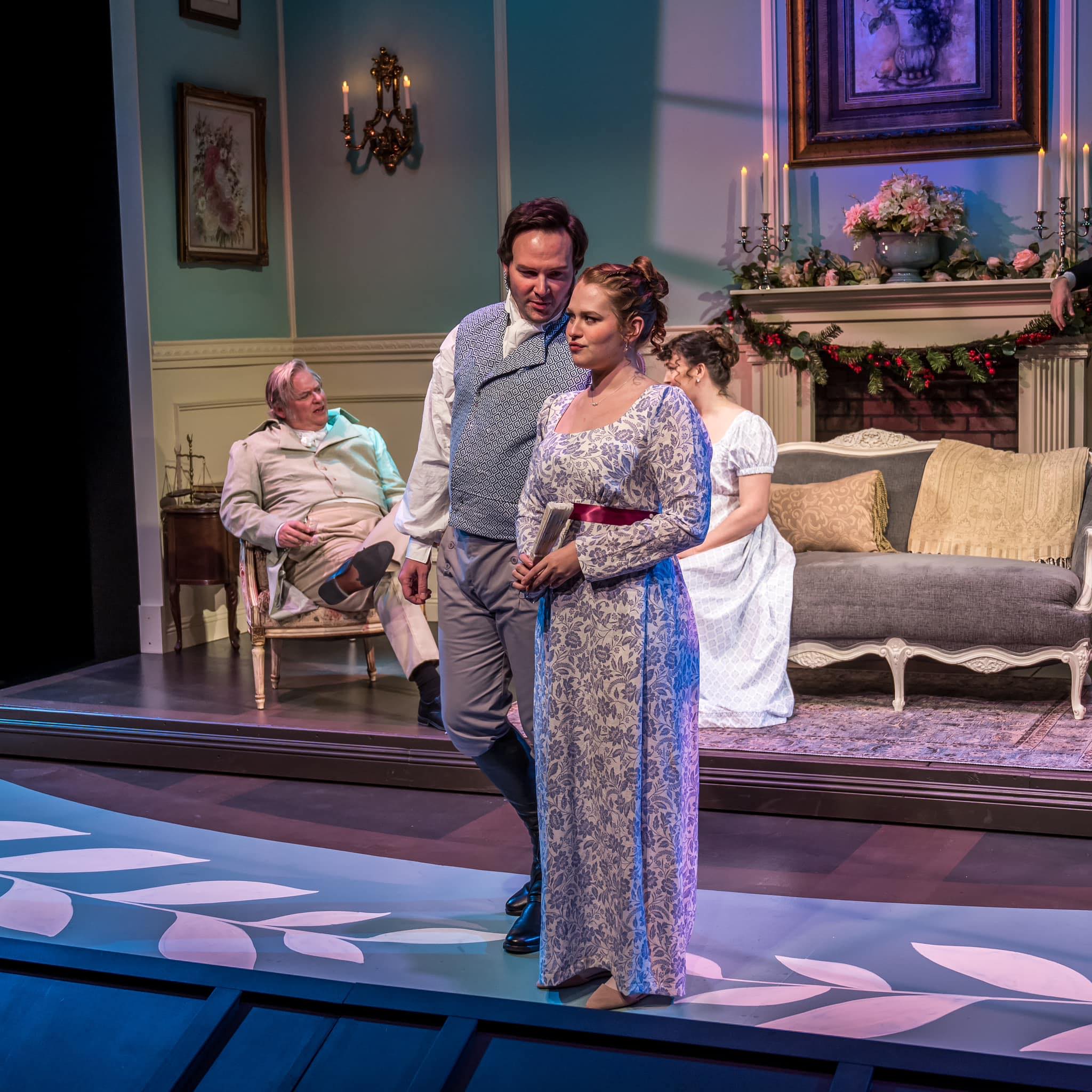SOUTH SALT LAKE — On State Street in South Salt Lake, there is a small, unassuming building. Tucked in between a car dealership and a storage facility, the former punk band/hypnotist/retro cinema would not necessarily draw attention, except for a beautiful art deco style sign that declares that it is the home of the Parker Theater. This little gem of a performing space is a testament to what hard work, elbow grease, and talent can awaken out of seemingly abandoned and forgotten spaces. When I walked through the front doors, I was greeted by a beautifully renovated lobby lined with tile and a welcoming box office and concessions area. In the theater itself, and the surprise continues, because this is not simply a family-run “let’s put on a show” venue, but a beautiful space where the imagination can run rampant. The season this year at the Parker Theatre begins with Emma, adapted by Michael Bloom from the Jane Austen novel. Brought to life on the stage, this production, directed by Jennifer Hohl, is a delightful homage to the Regency Era comedy of manners.

According to the novel and play, “Emma Woodhouse is handsome, clever, and rich… and had lived nearly twenty-one years in the world with very little to distress or vex her.” Austen herself said that she was the only person would like Emma, and indeed, at first the character is spoiled and vain and used to getting her own way in nearly every situation. Emma follows its title character through nearly a year in her life, as Emma takes on the project of an unrefined young woman named Harriet and convinces herself that she is the best at arranging the lives and loves of everyone around her. However, she makes a hash of things and ruins more than one potential romance before acknowledging her short-sightedness and ultimately claiming her own happily ever after.
Bloom’s adaptation captures most of the most beloved episodes in the novel and allows the audience to follow along with their favorite characters. The titular role of Emma is a formidable one, as the character rarely leaves the stage in the entirety of the performance. Ariana Bagley, in her Parker Theater debut, does a lovely job of expressing the vivacity, vanity, snobbery and sympathy of Miss Woodhouse. Bagley’s performance is full of vocal inflection and arched brows, making the audience feel as if they are in on her little intrigues.

As Knightley, John Hayes Nielsen is a suitable foil for Bagley’s appealing Emma, although a bit more stolid and with somewhat less of a lively sense of humor than Knightley has in some portrayals. Nielsen feels every one of the sixteen years he has on Emma, acting like a scolding uncle at times, yet manages to retain most of Knightley’s best characteristics. Yet, I wish I could have seen more of Knightley’s true fondness for Emma early on, rather than near-constant disapproval and censure. When he finally declares his long-lived love for Emma, my theatre companion (not a true Jane-ite) looked astonished and asked. “where did that come from?” Indeed, Mr. Knightley’s declaration to Emma is rushed and the ending of the play feels awkwardly truncated, which is a problem with Bloom’s script and not Nielsen’s performance.
Emma’s other foil takes shape in the form of Harriet Smith, a young, uncultured, “natural child” who lives at a nearby boarding school. Emma takes Harriet under her wing to assuage her feelings of abandonment in the marriage of her longtime governess/companion, Miss Taylor, to local gentleman Mr. Weston. Taylor McKay Barnes plays up Harriet’s gauche awkwardness to the fullest, perhaps even too much. While Barnes captures the essence of Harriet’s desire to be like Miss Woodhouse, copying her gestures and manner of speaking, the slapstick humor and physical inelegance she exhibits at the other end of the spectrum is almost appalling at times. Mrs. Weston/Miss Taylor (played by Eden Benson) was appropriately motherly and Jane Fairfax (played by Liz Nielsen) is perfectly reserved and superior. Abbie Webb as Miss Bates and Madeline Thatcher as Mrs. Elton round out the cast’s strong female contingency.
The men of Highbury are gentlemanly and gallant, as befits the Austen heroes. Frank Churchill is brought to delightful life by Ren Cottam, expressing the humor and petulance and energy and moodiness of a young man who has never been denied whatever bauble or trinket he desires. Cottam is appealing and dissolute at the same time. It is easy to see why Emma is charmed and Knightley is disgusted by his personage. The rest of the cast are equally well placed and well directed in telling the story.

The set design by James B. Parker is attractive, and the ingenious details are beautiful. The drawing room at Hartfield, the sleek arches that move in and out, the lovely furnishings of Randalls and the Oak Room all work together to create a Regency Era environment that is a perfect framework for the ensuing hijinks. Costumes by Paige Burton, Cathy Maurer, and Lauri Baird are serviceable and appropriate, but not stunning. While the costumes do not detract from the story, they do not add any insight or details to the characters. They are suitable and functional.
Spencer Hohl’s sound design added a wonderful emotional element to the scenes. The music helped to transition from scene to scene and underscored key moments. The idea is a good one and helped to heighten the emotional investment of the audience, but at times the volume was too loud for the actors, who were obliged to yell at the top of their lungs to be heard.
Overall, this production of Emma is a lovely version of a beloved novel which should delight fans of Jane Austen. The Parker Theater is a lovely venue that produces quality work. Emma is well worth its audience’s time and money.
[box]Emma plays Fridays and Saturdays at 7:30 PM and Saturdays at 3:30 PM through March 18 at the Parker Theatre (3605 South State Street, South Salt Lake). Tickets are $18-27. For more information, visit parkertheatre.org.[/box]

